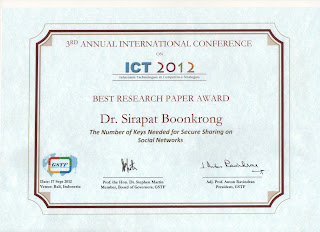There were many participants from around the globe, including (but not limited to) USA, Germany, Australia, Finland, Malaysia, India and Thailand (that's me!). The papers presented there were of good quality. The more interesting ones were on parallel processing using
GPU. It was presented by
Dr.Ming Ouyang, who is an assistant professor at the
Department of Computer Engineering and Computer Science, University of Louisville, USA. What he said basically was that nowadays comparing a normal
CPU with a GPU,the GPU is more suited to parallel processing due to its architecture. I spoke to him afterwards. He said that one of his students used a GPU to process intrusion detection mechanism and the results were pretty impressive. That is, it could run approximately four times faster than running this intrusion detection mechanism on a normal CPU. Having heard that I began to think how interesting it would be to use a GPU to run
cryptography and even to carry out
cryptanalysis. (Sorry, forgot to say that information and network security is really my research area.)
Anyway, enough about that. Let's talk a little bit about the paper I presented. The paper I presented was titled "The Number of Keys Needed for Secure Sharing on Social Networks." I reason I wrote this paper is because I realised that cryptography had not been widely used in social networks as much as it should be to give better privacy to information. One reason was that the number of keys that needed to be held was large. Therefore, I had to find a way to reduce that number, and this is what this paper was about.
Below is the abstract of paper. The full version can be read
here.
Online social networks have become an essential
tool for communications these days. With popularity come security problems,
especially with information privacy. One way to solve this problem is to use
cryptography. However, cryptography on online social networks has not been
studied exclusively. Most works have been done on access control. The main
issue with cryptography is the number of keys needed to encrypt and decrypt the
information. The most obvious number of keys would be to use one key for every
user in our group of friends. This is not entirely true as we show here. This
paper, therefore, gives an attempt to show that the number of keys needed to
achieve secure sharing among friends can in fact be fewer than the number of
friends. We also provide proofs of correctness and security to confirm our
claim.
This paper was also given the Best Research Paper Award by the Conference.


